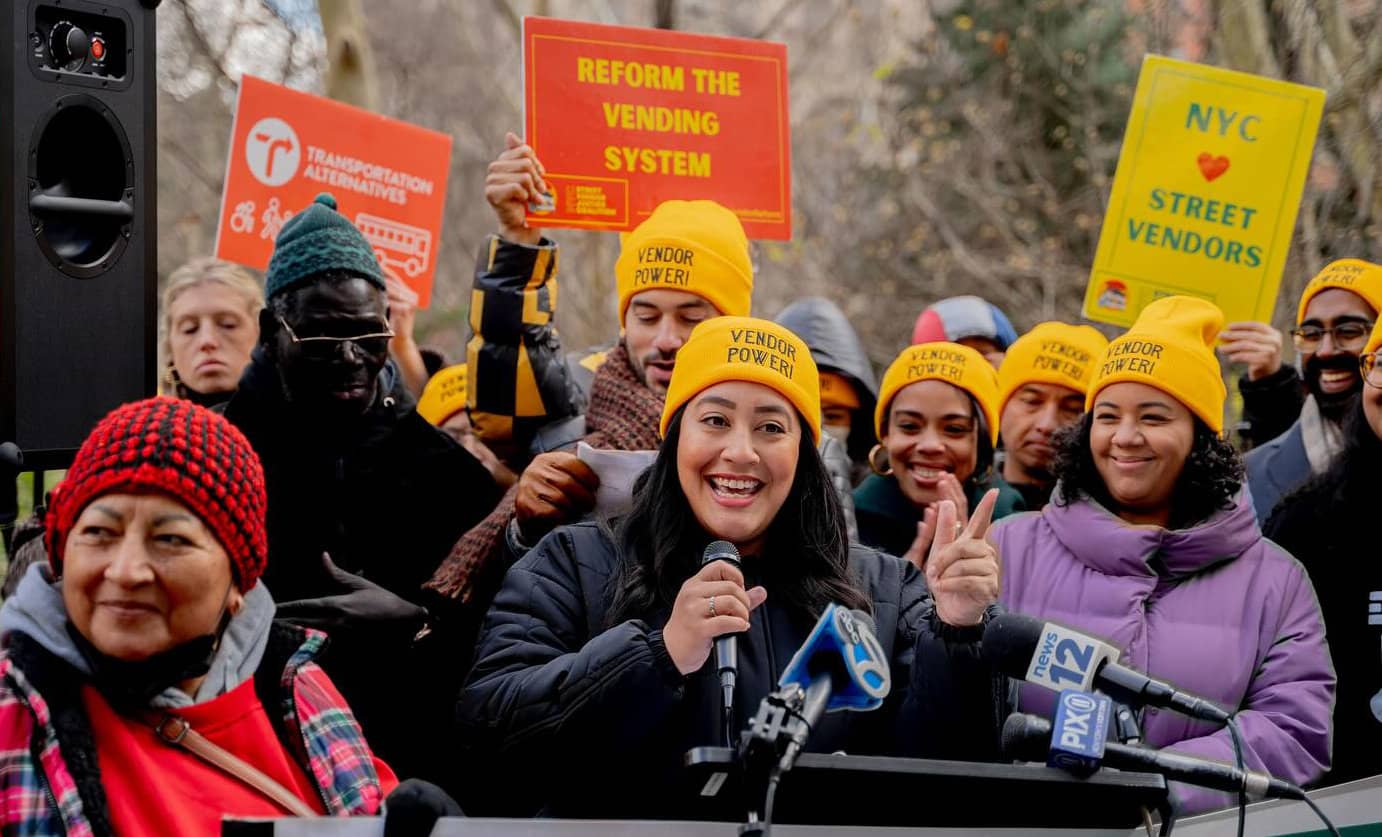
Dear friends,
As 2023 comes to an end, immigrant justice struggles continue on so many fronts: national and global migration politics; racial and class inequalities; community empowerment; and the lived realities–and failures–of refuge, asylum, and sanctuary. We encourage those of you who can, to consider an end-of-year donation to one of the local immigrant groups JHISN follows most closely, listed below in our What Can We Do section.
For our last issue of the year, we update you on the return of some of the immigrant street vendors displaced by the city from Corona Plaza. Their victory is only partial; hopes for a more just outcome will require an ongoing fight.
1. Tug of War Over Street Vending Enters New Stage
“To allow only a handful of vendors to return part-time ‘Feels like a slap in the face,’ said Ana Maldonado, 40, who ran a tamales stand in the plaza….’There is a lot of anger’ among the vendors.” —New York Times (11/28/23)
“It’s a foundation. It’s not the end-all-be-all. It’s not the perfect agreement.” —Carina Kaufman-Gutierrez, deputy director, Street Vendor Project
After months of arm-twisting and horse-trading, the Adams administration has agreed to allow a limited number of street vendors back to Corona Plaza. The deal includes stringent restrictions. A “Community Vending Area” has been established under the formal authority of the Queens Economic Development Corporation (QEDC), a non-profit that works with the city to promote small business development. Since the QEDC will now run the vending area as a private enterprise, taking responsibility for enforcing all city and state regulations, vendors who they sponsor avoid the requirement to get (unobtainable) individual licenses.
Fourteen standardized blue stalls have been deployed to be shared among the 80 members of the Corona Plaza Street Vendor Association (CPSVA). Craft items are for sale now; food sales will come soon. Once the market is in full operation, each eligible vendor will have access to a stall about once a week. The vending area will only be open from 9 a.m. to 8 p.m., effectively preventing the revival of the former, celebrated, night food market. As Gaston Cortez, president of the CPSVA says, “From 5:00, all the way to 11:00—that’s the best time for food vendors.” Cortez, who works with his wife to sell chilaquiles, tacos, and Mexican soups, says he will be forced to hustle odd jobs to help pay the family’s bills.
The CPSVA and their allies are pushing for more stalls and expanded hours. They’ve expressed hope that their partial victory at Corona Plaza will be a first step in decriminalizing street vending, and will help establish a pattern for legal street vending across the city. At a press conference on December 12, Deputy Mayor for Operations Meera Joshi seemed willing to consider opening other Community Vending Areas if the Corona Plaza “experiment” is successful.
It’s not clear how much impact the Community Vending Area model might have for the 12,000 vendors—mostly immigrants—who are currently on the city’s waiting list for vendor licenses. Or the thousands more who aren’t even allowed to join that list, which is currently closed. Nor can the city be considered a trusted partner, having broken its promises to the vendors over and over.
Vendors are especially skeptical of the Adams administration’s intentions in light of the ongoing crackdown at Brooklyn’s Grand Army Plaza greenmarket. Parks Enforcement Patrol has been aggressively citing unlicensed vendors and forcing them to leave Prospect Park. Some vendors have moved to nearby traffic medians or in front of the Brooklyn Central Public Library. Cynthia Blade, a long-time craft and vintage jewelry vendor, told Gothamist, “They’re shutting us down at the height of the holiday season. I would say…80% to 90% of my annual income comes from the holiday season.” Not far away, another enforcement blitz—on the Brooklyn Bridge—has resulted in 240 citations by Sanitation Department cops.
But street vendors are taking the offensive too. On Wednesday, December 6, hundreds of people chanting “Vendor Power!” rallied in support of a new city council initiative that would provide substantial relief. The four-part legislative package is being put forward by council members Pierina Sanchez (the daughter of street vendors from the Bronx), Amanda Farias, Jackson Heights council member Shekar Krishnan, Carmen De La Rosa, and public advocate Jumaane Williams. The first of the proposed laws would mandate that the city issue at least 3,000 vending licenses a year for five years, after which there would be no cap. The second would make unlicensed street vending a civil offense instead of a crime. The third would establish a Department of Small Business Service to assist vendors. The final piece of legislation would clarify rules about where vendors could operate. “We are one of the only cities in the United States of America that arbitrarily caps vending,” Sanchez argues. “The solution lies in business licensing. It lies in decriminalization.”
WHAT CAN WE DO?
- Buy food and crafts from your local street vendors.
- Support legislation by Shekar Krisan and other city council members to uncap licenses and decriminalize street vending.
- Make an end-of-year donation, if you are able, to Centro Corona, DRUM, Adhikaar, NICE, Damayan, or Make the Road NY.
In solidarity and with collective care,
Jackson Heights Immigrant Solidarity Network (JHISN)
Follow @JHSolidarity on Facebook and Twitter and share this newsletter with friends, families, neighbors, networks, and colleagues so they can subscribe and receive news from JHISN.